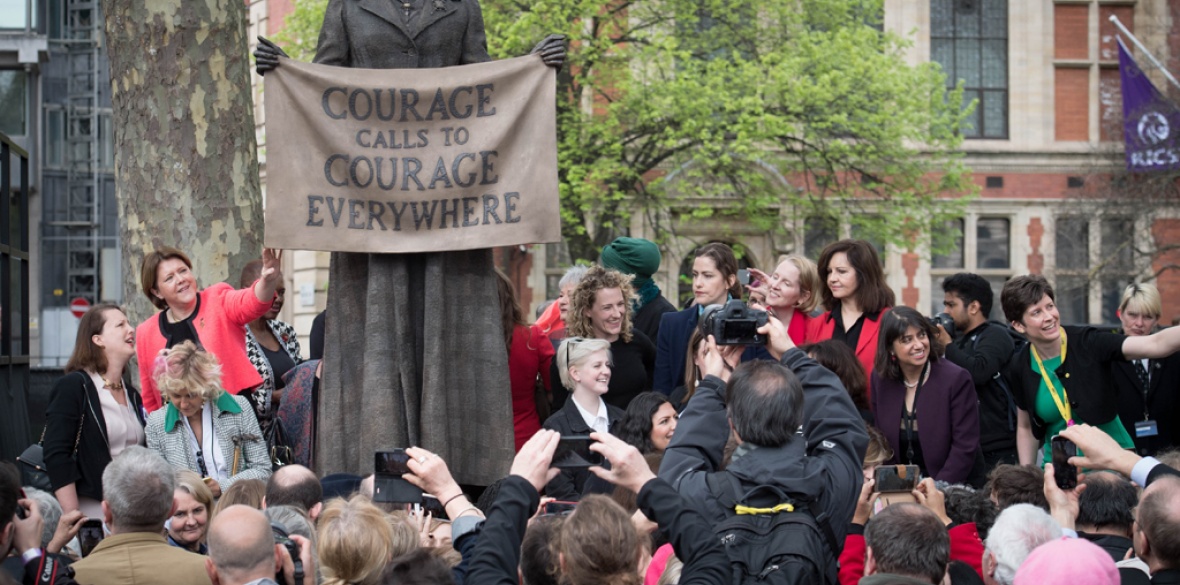This is the last article you can read this month
You can read more article this month
You can read more articles this month
Sorry your limit is up for this month
Reset on:
Please help support the Morning Star by subscribing here
ONE HUNDRED years after the first women in Britain achieved the right to vote, it was in incredible privilege to attend the unveiling of the statue of suffragist Millicent Fawcett on Parliament Square.
Prime Minister Theresa May and the Mayor of London Sadiq Khan spoke at the event. The leader of the Labour Party, Jeremy Corbyn had a front-row seat.
It was writer and campaigner Caroline Criado-Perez who, having run a successful campaign to ensure that women were represented on banknotes, noted and immediately acted upon the woeful absence of a woman statue among the 11 men commemorated as she ran through the square on International Women’s Day 2015.
Khan, elected as mayor of London two months later, described his decision to support Criado-Perez’s campaign as a no-brainer.
Women’s representation matters. It matters that our contributions to society are noted, recorded and known. It matters that girls know that women play a role in shaping the world. It matters that we continue to name, fight and resist male supremacy and the subjugation of women. It matters that Criado-Perez and others working on the campaign made sure that the first statue of a woman on Parliament Square was also the first statue produced by a woman, sculptor Gillian Wearing. It matters that a woman is celebrated because she was a significant political figure fighting for women’s rights, that she is not naked and sexualised, that she was not a royal.
The statue holds a placard inscribed with words from a speech she gave after the death of suffragette Emily Wilding Davidson: “Courage calls to courage everywhere.”
And, as Criado-Perez says: “She’s directly facing Parliament with her placard, so the MPs can see her every day and think: ‘I should probably go and sort that problem out’.”
With this reference to their everyday decisions and actions, Criado-Perez challenges politicians to make sure that women are not simply remembered on all too rare occasions of celebration.
May opened her speech with a reference to the Supreme Court, the final court of appeal in Britain for civil cases, directly behind the statue and facing Parliament. The same court I attended earlier this year with nia, the organisation I work for, with Southall Black Sisters, Rape Crisis and the End Violence Against Women Coalition supporting two of the women assaulted by serial predatory rapist John Worboys. Women who May had intervened against as home secretary when she backed the Metropolitan Police’s appeal against an earlier ruling which found that it had breached the Human Rights Act by failing to properly investigate reports of rape.
The Prime Minister stood and celebrated the rights of women and our representation in front of the same court in which she fought tooth and nail against women trying to access their rights.
Khan made at least three mentions of “gender equality” in his speech, a reference to his “Behind Every Great City” campaign for women’s equality.
If Khan is the feminist he claims to be, then he should surely know that women are oppressed by our sex, and that gender — the code of behaviour, rules and stereotypes of femininity and womanhood — is a tool of that oppression.
There can be no gender equality because gender is in and of itself inequality. Using sex and gender as interchangeable terms is an obstruction to women’s equality and is at the root of a current problem for the Labour Party: all-women shortlists.
The policy of all-women shortlists was adopted by Labour to increase the proportion of women in Parliament and it has been working.
However, recently Labour announced that all-women shortlists are — and indeed always had been — open to those who are male but identify as women, whether self-identified or holding a gender recognition certificate.
Many critics of this move recognise the call for political representation of those who say that they are transgender but argue that this representation should not come at the expense of the political representation of another marginalised group: women.
Why should the under-represented group, the sex-class of women, be those making space? What about the men? Why should it not be them?
Khan’s commitment to dealing with men’s violence against women is underwhelming at best. Reports of rape in London have risen 20 per cent in a year.
Waiting lists for women trying to access London’s Rape Crisis centres are getting longer but funding has not increased since the previous mayor of London Boris Johnson quadrupled the capital’s Rape Crisis provision.
Women’s representation matters. There are still half as many female MPs as male. Millicent Fawcett fought for women’s rights. I am delighted that she has been commemorated on Parliament Square; though that she stands amongst 11 men is a reminder, should we be in danger of forgetting, that the fight for women’s equality is far from won.
Men’s violence against women is both a cause and consequence of sex inequality. We cannot tackle the latter if we do not properly address the former.
Warm words in front of a long overdue statue are not enough, especially if actions behind the scenes belie what is said.
I hope that our MPs fulfil Criado-Perez’s wish that the statue inspires politicians and policy-makers to centre women in their day-to-day business and I’d like to see the work to end men’s violence against women brought to the forefront.
Karen Ingala Smith is CEO of domestic and sexual violence charity nia.











